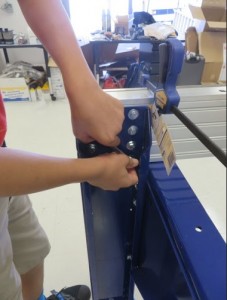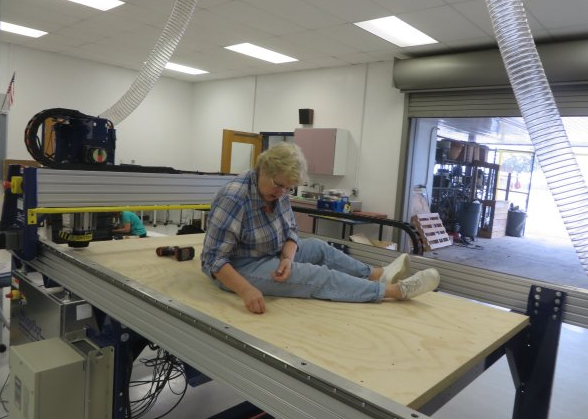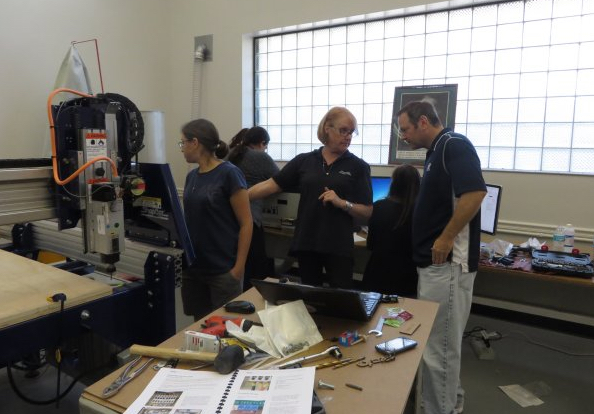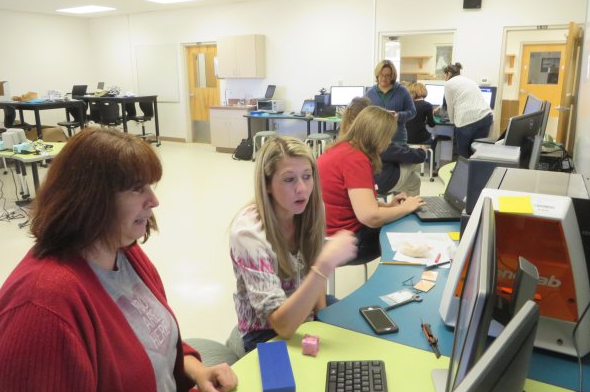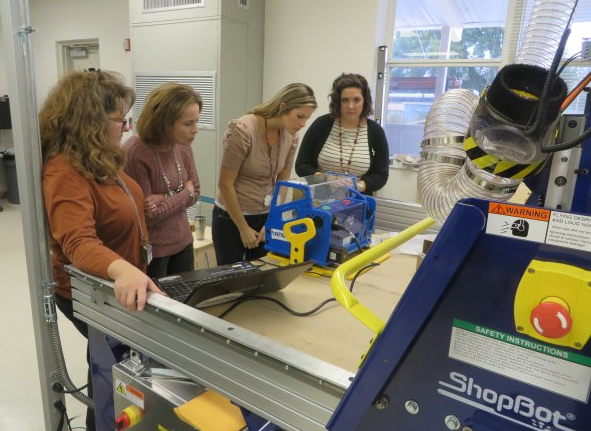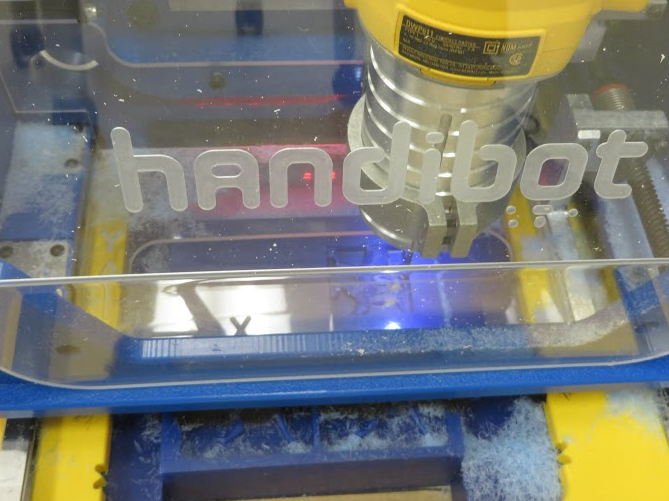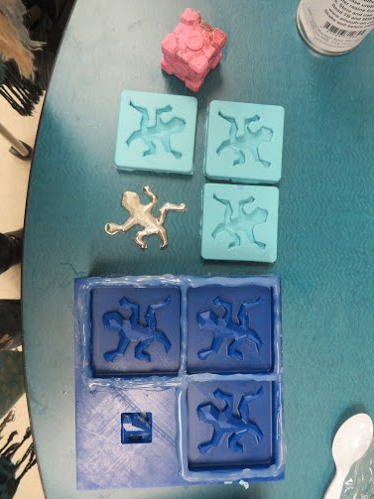There has certainly been a lot of press ink, as well as talk coming from the business and political establishment, about the need for more STEM education in the U.S. to better educate our young people to compete for jobs. Nowhere is the talk turning into action more than in Polk County, Florida, where multiple schools (some revamped, some new, at both the middle and elementary school level) have been reimagined — and now funded — to put STEM and STEAM education into practice. STEAM adds the “A” for Arts in addition to curricula in Science, Technology, Engineering and Math. ShopBot Tools is one of a number of digital manufacturing companies that are involved in creating FabLabs at the schools and training the teachers to become familiar with their use.
Why now and why Polk County? The business community is demanding it!
The local business community in the County has clearly expressed the need for increased student performance to help feed the local economy by providing well-prepared workers. Polk Vision, a civic initiative with professional staff, has held exhaustive public meetings to develop a
communitywide plan for increasing the local quality of life. Education is a top strategy, with
objectives to increase the high school graduation rate, college-educated workforce, and overall
literacy.
A bit of history explains why.
Polk County has a history of cattle ranching, citrus production phosphate strip mining and
tourism. Times have changed. Legoland, offering mechanical and mathematical
engineering activities for local students through construction and robotics, has replaced Southern belles at the former site of Cypress Gardens. CSX, a railroad transport company, has a new terminal and logistics center (rail to truck) under construction in Winter Haven, Polk‘s second-largest city. Polk has the state‘s largest concentration of rail lines, serving Tampa and Orlando, with warehousing and distribution centers along Interstate-4 that use sophisticated, electronic controls for inventory and shipping. The Publix Supermarkets headquarters in Polk‘s largest city, Lakeland, provides IT and marketing research services throughout the chain. These industries require graduates with strong background in STEM.
The EduSTEM project in which ShopBot and other digital fabrication manufacturers are playing a part, consists of four schools, one revised magnet and three new projects, that will create an opportunity for students in rural and severely under-employed areas of this vast county (Polk County consists of 2,010 square miles) to have meaningful and rigorous academic experiences. Many of the families of students identified in this project will have the opportunity to be the first in their families to attend college.
What’s been happening…
Sallye Coyle, ShopBot’s Outreach Liaison to Education, recently visited Polk County to help with installation and education about ShopBot Tools to teachers and other staff. She wrote, “Charter schools in Polk Co, Florida have added two new FabLabs at the middle school level. In a flurry of activity, a team from TIES (www.TIESTeach.org) arrived to build the ShopBot gantry tool, unpack boxes, set up the Epilog laser cutter, Ultimaker 3D printer, and Roland vinyl cutter and mill, and sort the electronics station. Teacher training which began last spring and summer at the FabLab installed at Lawton Chiles Middle School, continued this winter. Week 1 was spent at Jewett School of the Arts, where teacher Ashley Corwith took ownership of her FabLab in an art classroom of the school. Week 2 took place at Dundee Ridge, a middle school in rural setting surrounded by orange groves.”
Sallye explained, “Teachers from the middle schools and elementary schools, as well as folks from the Central Office contributed to the set ups and took part in trainings. A surprise visitor was the Handibot® Smart Power Tool and crate that was ordered for possible use in elementary schools. It came in handy to mill 3D molds in machineable wax for a lesson in molding and casting. The staff loved that the Handibot tool could be run on the ground or a low table, putting it at a level that elementary kids could appreciate.”
Mijana Lockard is the STEM Coordinator for the schools. She noted that “The kids absolutely love this technology. They are the ‘digital natives’ and have no problem jumping right in and using the equipment. If anything, the challenges to implementation relate to making school administrators appreciate the value of FabLabs beyond being the ‘cute shop elective’ — instead seeing that integrating technological education with traditional subject matter is crucial to education today. And some of the teachers need to be brought along so that they become comfortable using the technology themselves, in preparation to teach their students.”
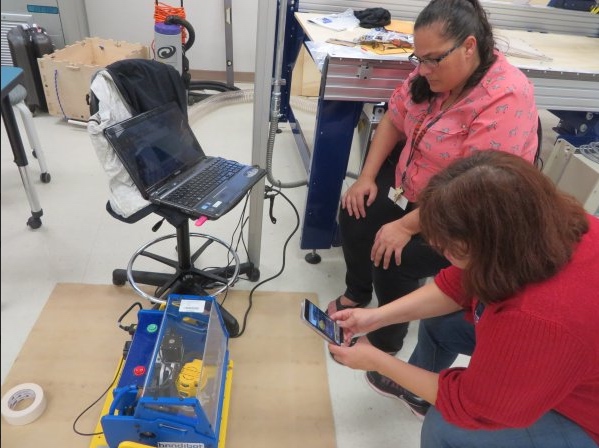
Teachers use Handibot Smart Power Tool to mill 3D molds in machineable wax for a lesson in molding and casting
Mijana said, “It’s so exciting and heartening to see the children’s reaction to using the equipment. Learning by making in the FabLab is helping them become independent thinkers and problem solvers. They’re not afraid to try and fail, and try again. It really builds confidence.”
